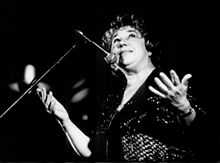1926 in jazz
| 1926 in jazz | |
|---|---|
 A jazz ensemble playing in Berlin in the summer of 1926 | |
| Decade | 1920s in jazz |
| Music | 1926 in music |
| Standards | List of 1920s jazz standards |
| See also | 1925 in jazz – 1927 in jazz |
In 1926 in jazz standards published included "Big Butter and Egg Man", "Bye Bye Blackbird" and "'Deed I Do". Musicians born that year included Miles Davis and John Coltrane.
Events
- American author and dramatist Edna Ferber publishes the novel Show Boat, popularizing life in the Southern United States. Although Ferber never visited the south and invented her story from fictional minstrel themes, the real American Show Boats were steeped in the black Riverboat Jazz music of Mississippi and the Ohio Valley.[1]
- American ragtime jazz pianist, bandleader and composer Jelly Roll Morton is signed by Victor and begins recording with the Red Hot Peppers, featuring Kid Ory, Omer Simeon, George Mitchell, Johnny St. Cyr, Barney Bigard, Johnny Dodds, and Baby Dodds.
Album releases
- Louis Armstrong's Hot Five releases recordings on Okeh: Virtuoso cornet work on Cornet Chop Suey,[2] introduction of skat singing on Heebie Jeebies.[3][4]
- Jelly Roll Morton's Red Hot Peppers recordings on Victor:"Sidewalk Blues."[5][6]
Standards
See also: List of 1920s jazz standards
Births

Jazz musician Miles Davis, photo by Tom Palumbo.

Czech jazz singer Vlasta Pruchova, Lucerna Hall, Prague 1985

Jazz guitarist Franco Cerri in Milano, Italy in September 2008
- Bernie Glow, American trumpet player
- Bill Smith, American clarinetist and composer
- Billy Mitchell, American saxophonist
- Billy Usselton, American reed player
- Bob Flanigan, American vocalist
- Bobby Jaspar, saxophonist, flautist and composer
- Bonnie Wetzel, American double-bassist
- Bucky Pizzarelli, American guitarist and banjo player
- Bud Shank, American alto saxophonist and flautist
- Buddy Arnold, American saxophonist
- Buddy Childers, American trumpet player
- Buddy Greco, American singer and pianist
- Carlos Valdes, Cuban-born conga player
- Charlie Biddle, Canadian bassist
- Chris Anderson, American pianist
- Clarence Shaw, American trumpet player
- Claude Williamson, American pianist
- Curtis Counce, American double-bassist
- Cy Laurie, English clarinetist and bandleader
- Dave Bailey, American drummer
- Don Elliott,
- Don Rendell,
- Elek Bacsik, American vocalist and guitarist
- Ernie Henry, American saxophonist
- Franco Cerri, Italian guitarist
- Frank Rehak, American trombonist
- Frank Rosolino, American trombonist
- George Masso,
- George Melly, English singer
- Hal Russell,
- Herbie Jones,
- Herbie Steward,
- Hitoshi Ueki,
- Jack Brokensha,
- Jack McDuff, American organist
- Jackie Paris, American singer and guitarist
- Jeri Southern, American pianist and singer
- Jesse Drakes, American trumpet player
- Jimmy "Jammin'" Smith, American trumpet player
- Jimmy Cleveland, American trombonist
- Jimmy Gourley, American guitarist
- Jimmy Heath, American jazz saxophonist
- Jimmy Woode, American bassist
- Joe Houston, American saxophonist
- John Coltrane,[7] American saxophonist and composer
- Johnny Coles, American trumpeter
- Johnny Windhurst, American trumpeter
- Julie London, American singer
- Jymie Merritt, American double-bassist
- Kenny Hagood, American vocalist
- Lou Bennett,
- Lou Donaldson, American alto saxophonist
- Melba Liston, American trombonist, composer and arranger
- Miles Davis,[8] American trumpeter, bandleader and composer
- Milt Bernhart, American trombonist
- Mimi Perrin, French pianist and singer
- Monty Budwig, American double-bassist
- Oscar Brown, American singer
- Phil Seamen, English drummer
- Pony Poindexter, American saxophonist
- Randy Weston, American pianist and composer
- Ray Brown, American double bassist
- Ray Copeland,
- Rick Fay, American clarinetist and saxophonist
- Rob Swope, American trombonist
- Russ Freeman, American pianist and composer
- Sonny Bradshaw, Jamaican bandleader and trumpeter
- Sonny Payne, American drummer
- Stan Barker, English pianist
- Stan Levey, American drummer
- Stan Tracey, British pianist and composer
- Tony Bennett, Italian-American singer
- Tony Terran, American trumpet player
- Urbie Green, American trombonist
- Vlasta Průchová, Czech jazz singer
- Walt Harper, American pianist and nightclub owner
- Will Davis, American pianist
- Willie Dennis, American trombonist
Music criticism
- August: David Stanley Smith (1877–1949) Professor of Music at Yale University, dismisses Jazz as a serious art form in The Musician.[9]
- November: Andrè Coeuroy (1895–1980) and Andrè Schaeffner publish Le Jazz.[10]
- Jacques Émile Blanche (1861–1942) criticizes Jazz music and dance in La Revue nouvelle as a foreign import that threatens the nationality of France.[11]
See also
References
- ↑ Kenney, William Howland (2005). Jazz on the River. University of Chicago Press. ISBN 0-226-43733-7.
- ↑ "Louis Armstrong - Cornet Chop Suey". YouTube. Retrieved 2010-12-02.
- ↑ Ward, Geoffrey C., "Jazz: a history of America's music." Knopf, 2000. Pages 130, 131. ISBN 0-679-44551-X
- ↑ Larson, Thomas E.E. The history and tradition of jazz." Kendall Hunt Pub Co, 2002 Page 59. ISBN 978-0-7872-7574-7.
- ↑ Ratliff, Ben "The New York Times essential library: Jazz"a critic's guide to the 100 most important recordings." Times Books, 2002,Page 17. ISBN 978-0-8050-7068-2
- ↑ Ward, Geoffrey C., "Jazz: a history of America's music." Knopf, 2000. Pages 136-137. ISBN 0-679-44551-X
- ↑ Porter, Lewis (1999). John Coltrane: His Life and Music. University of Michigan Press. ISBN 0-472-08643-X.
- ↑ Chambers, J. K. (1998). Milestones: The Music and Times of Miles Davis. Da Capo Press. ISBN 0-306-80849-8.
- ↑ Lopes, Paul Douglas (2002). The Rise of a Jazz Art World. Cambridge University Press. p. 82. ISBN 0-521-00039-4.
- ↑ Porter, Lewis (1997). Jazz: A Century of Change. Schirmer Books. ISBN 0-02-864713-0.
- ↑ Blake, Jody (1999). Le Tumulte Noir: Modernist Art and Popular Entertainment in Jazz-Age Paris, 1900-1930. Penn State Press. p. 86. ISBN 0-271-01753-8.
| ||||||||||||||||||||||||||||||||||||||